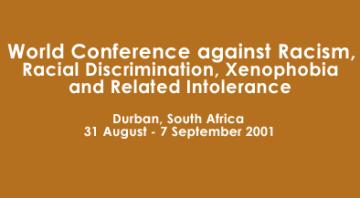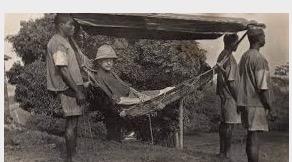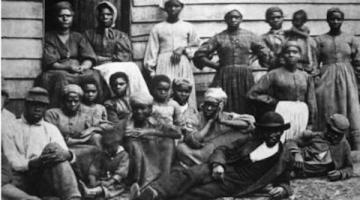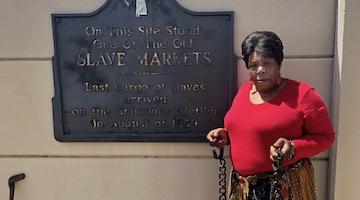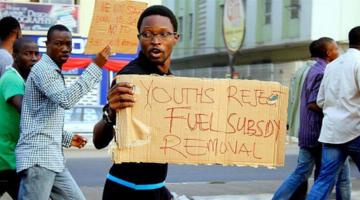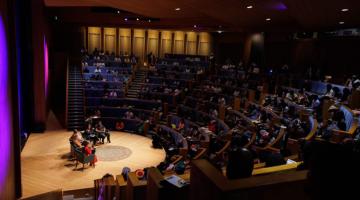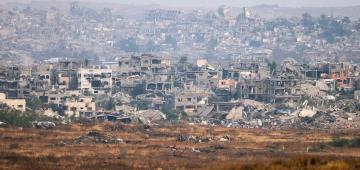(Photo: D. De Lorenzo/Deutsche Welle)
The pursuit of justice and reparations for African people has been constant. The question of whether to pursue appeals for concessions or active struggles for power, has not been resolved.
After W.E.B. Du Bois and others made polite requests to convene a Pan-African Congress in Paris[1] in 1919, French Prime Minister Georges Clemenceau gave no immediate response, but ultimately told the organizers: “Don’t advertise it but go ahead.”
Fifty-seven delegates representing nine African countries, the U.S. and the Caribbean attended in their finery, sat around long green tables, and with the objective of transferring control of Africa from colonizers to the League of Nations hammered out a series of resolutions. One that addressed the most critical of issues – land, stated in part: “[T]he land and its natural resources shall be held in trust for the natives and at all times they shall have effective ownership of as much land as they can profitably develop.”
It was a far cry from the spirit of Izwe Lethu (“the land is ours”), and such a resolution grates against every political nerve of 21st Century revolutionaries. But in 1919, with the whole of Africa locked in the vise-like grip of colonialism, and with those who aspired to African freedom forced to ask with hat in hand for permission to even discuss Africa’s fate in Paris, a resolution of that kind may have seemed not only practical but progressive.
My, how things changed. At the end of the fifth Pan-African Congress in 1945, delegates attacked capitalism, demanded independence, and in a “Challenge to the Colonial Powers” they warned: “…if the Western world is still determined to rule mankind by force, then Africans, as a last resort, may have to appeal to force in an effort to achieve Freedom, even if force destroys them and the world.”
In both the first and fifth Pan-African Congresses, participants demonstrated a commitment to African liberation, but the qualitative and significant difference between the two is that the former was an appeal to colonial power for benevolence and cooperation; and the latter was a bold declaration of plans to achieve African power by any means necessary.
This duality (appeals to power versus struggles to take power) has been a recurring, cyclical pattern in movements for African freedom. For example, during the early phases of the U.S. Civil Rights Movement, activists petitioned power for political, social, and economic inclusion. Contrast that with the Black Power Movement which had a generally acknowledged goal of seizing power.
Since the 1960s, African resistance to oppression has been constant, but Africans have never reconciled their multiple strategic tendencies. While there has not been a consensus about whether to simply demand concessions from power or to instead engage in revolutionary struggles to take power, there have at least been dominant tendencies. Consider that as militant as many of the struggles against police violence may have been in the wake of the murder of George Floyd, most have not endeavored to purge and take over police departments. There is usually a presumption that any changes – even the defunding of police departments, will be implemented in response to demands made to those with the power to make those changes.
In what is perhaps the latest initiative for African freedom, both longtime stalwart freedom fighters and various high-profile luminaries attended the “Advancing Justice: Reparations and Racial Healing Summit” in Accra, Ghana. The summit’s final declaration proclaimed:
“We begin by affirming the thrust of the Durban Declaration and Program of Action in declaring that massive harms committed by various European governments, institutions, corporations and families equated to crimes against African humanity. That the crimes of the Transatlantic Slave Trade, colonialism, apartheid and neocolonialism and the systems, structures and institutions established to perpetuate these harms have left a negative injurious legacy that impacts every aspect of the lives of people of African descent around the world, in the present day and stymies the capacity to be fully self-determining and accorded the rights owed by virtue of being human.”
This is an honest and poignant statement of African realities. However, it begs the question of what is to be done. Summit participants answered by stating: “We further hold that there is both a moral and legal obligation of the perpetrators of the crimes to engage in full reparations wherever the crimes were committed and the legacies persist.”
Admittedly, the whole notion of reparations for Africans rests on the premise that oppressive forces with power must concede their obligation to do justice. Consequently, one might conclude that a movement for reparations within the current political paradigm limits it to petitioning power for concessions, even if those petitions take the form of militant demands. Given our knowledge of political realities, we are compelled to consider the implications of such a predicament.
As part of its plan for demanding reparations from oppressors, the summit declaration calls: “… for foundational support for and engagement of the Social Movements in the Global African Reparations Movement, for example, the Global Pan African Movement, CARICOM Reparations Commission, [National African-American Reparations Commission], Africa Transitional Justice Legacy Fund, and others…” Caution is warranted here because, as many have learned the hard way, “he who pays the piper calls the tune,” and the very oppressive forces that will be asked to concede demands for reparations can effectively take control of the movement.
Capitalism has fine-tuned what many refer to as the “Non-profit/Industrial Complex.” It is a time-tested method of controlling movements by turning the funding spigot off and on. Specifically, a non-profit or NGO might have the best of intentions in supporting reparations work, but if the organization’s capitalist grantors are troubled by the direction of the reparations movement, funding conditions may be imposed that limit, restrict or even direct the recipient organization’s program. To receive its funding and keep its doors open, a non-profit may find itself in the uncomfortable position of urging the movement away from demands for “reparations now” and instead toward a posture of “let’s study reparations a bit more before doing anything drastic.”
Caution is warranted as well regarding even the most basic notion of collaborative engagement with oppressive forces. The summit declaration proposes: “a Global Summit of colonial powers/governments, financial institutions, corporations, and other institutions that propagated and benefited from enslavement in order to advance a process of truth, justice and accountability.”
Many oppressors are scrambling because of the continuing collapse of global capitalism and empires. This is most evident in the U.S. because after the protracted expansion of its empire, which has required constant deployment of military forces to far-flung corners of the globe and the movement of industry beyond U.S. borders, there has been domestic economic and infrastructure deterioration that has caused widespread internal tension, confusion, fear and chaos. The likelihood of willing, genuine engagement by the U.S. empire in a discussion of reparations is slim. In fact, the chances for successful engagement would be no greater if the empire were strong because its strength would rest in preservation of the conditions reparations would presumably repair.
God has provided Africans with the capacity for self-liberation. The only question is whether full advantage will be taken of those blessings. Summit participants have rendered great service in developing a plan for demanding that power concede reparations. But implicit in its work is also an opportunity to organize to take reparations whether oppressive forces like it or not.
The summit declaration states: “We will engage in dialogue and discussion on the term ‘Global African’ as an inclusive identity of Black people around the world. It is evident that across the globe, there is a direct lineage to Africa. We are all Africans wherever we landed and wherever we reside.” The declaration also states: “We will address the urgent need for independent, self-sufficient knowledge systems and Black media/Communications platforms to propagate and spread knowledge to empower Global African movements.”
These resolutions suggest first that Africans end micro-national identification and recognize there is strength in global African unity. Second, the idea of African independence moves Africans closer to the capacity to act without limiting their actions to those that will appease oppressors. Demands can be made for voluntary reparations concessions, but “Global Africans” will increase the likelihood of success if at the same time they, by virtue of worldwide African unity and independence, are poised and ready to take them if those in power won’t concede.
Frederick Douglass famously proclaimed: “Power concedes nothing without a demand.” Through experience we know: “Power concedes nothing – period.” We can continue to make demands and hope for positive responses. But for reparations, and everything else we need, we are likely to fail unless we are prepared to also take what we want.
[1] W.E.B. Dubois, “The Collapse of Europe,“ in The World and Africa and Color and Democracy” (New York: Oxford Press, 2007), 6 – 8.
Mark P. Fancher is an attorney and writer. He can be contacted at mfancher[at]comcast.net.



